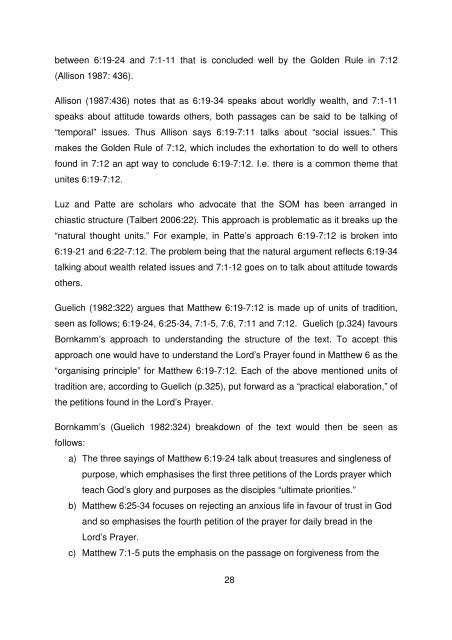O'Donoghue MTh_Thesis-FinalCopy.pdf - South African Theological ...
O'Donoghue MTh_Thesis-FinalCopy.pdf - South African Theological ...
O'Donoghue MTh_Thesis-FinalCopy.pdf - South African Theological ...
You also want an ePaper? Increase the reach of your titles
YUMPU automatically turns print PDFs into web optimized ePapers that Google loves.
etween 6:19-24 and 7:1-11 that is concluded well by the Golden Rule in 7:12(Allison 1987: 436).Allison (1987:436) notes that as 6:19-34 speaks about worldly wealth, and 7:1-11speaks about attitude towards others, both passages can be said to be talking of“temporal” issues. Thus Allison says 6:19-7:11 talks about “social issues.” Thismakes the Golden Rule of 7:12, which includes the exhortation to do well to othersfound in 7:12 an apt way to conclude 6:19-7:12. I.e. there is a common theme thatunites 6:19-7:12.Luz and Patte are scholars who advocate that the SOM has been arranged inchiastic structure (Talbert 2006:22). This approach is problematic as it breaks up the“natural thought units.” For example, in Patte’s approach 6:19-7:12 is broken into6:19-21 and 6:22-7:12. The problem being that the natural argument reflects 6:19-34talking about wealth related issues and 7:1-12 goes on to talk about attitude towardsothers.Guelich (1982:322) argues that Matthew 6:19-7:12 is made up of units of tradition,seen as follows; 6:19-24, 6:25-34, 7:1-5, 7:6, 7:11 and 7:12. Guelich (p.324) favoursBornkamm’s approach to understanding the structure of the text. To accept thisapproach one would have to understand the Lord’s Prayer found in Matthew 6 as the“organising principle” for Matthew 6:19-7:12. Each of the above mentioned units oftradition are, according to Guelich (p.325), put forward as a “practical elaboration,” ofthe petitions found in the Lord’s Prayer.Bornkamm’s (Guelich 1982:324) breakdown of the text would then be seen asfollows:a) The three sayings of Matthew 6:19-24 talk about treasures and singleness ofpurpose, which emphasises the first three petitions of the Lords prayer whichteach God’s glory and purposes as the disciples “ultimate priorities.”b) Matthew 6:25-34 focuses on rejecting an anxious life in favour of trust in Godand so emphasises the fourth petition of the prayer for daily bread in theLord’s Prayer.c) Matthew 7:1-5 puts the emphasis on the passage on forgiveness from the28
















